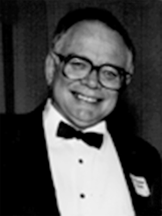Lifetime Achievement Award 2014

2014 API Lifetime Achievement Award
Thomas L. Lincoln, MD
The Association for Pathology Informatics presented its Lifetime Achievement Award for 2014 to Thomas Lincoln, M.D. at the ASCP 2014 annual meeting in Tampa. The presenter was Dr. Rodney Schmidt.
Dr. Lincoln had been a faculty member for over 3 decades in the Department of Pathology at the Keck School of Medicine of the University of Southern California, quickly rising to the rank of Professor, specializing in medical informatics. In 1981, he directed the implementation of comprehensive laboratory information systems at the LAC/USC Medical Center, one of the largest/most complex hospital laboratories in the United States. He served as Chief of Clinical Information Systems at Los Angeles County/University of Southern California Medical Center. He also served as a scientist at the RAND Corporation, beginning in 1967, focusing on computer applications in the fields of medicine and healthcare. From 1995 to 1996 he was Consultant Chief Scientist for Sunquest Information Systems in Tucson AZ. Between 1997 and 2000 he served as Research Professor of Medical Informatics in the School of Biomedical and Health Information Sciences at the University of Illinois at Chicago, working with the HL7 XML SIG and PRA (Patient Record Architecture) Technical Committee on XML applications for healthcare messaging and record formatting.
Dr. Lincoln served as a key informatics faculty member of the CAP and ASCP national meetings from the 1970's thru 1990's. He has published articles focused on a range of topics but with most in reference to improvements of the clinical laboratory and in them including some of the earliest articles in the literature making specific reference to medical informatics and the electronic medical record. A seminal 1980 article in Science entitled Computers, Health Care, and Medical Information Science helped define the specialty of Clinical Informatics. In a 1983 JAMA article entitled: Ready! Fire! AIM! An Inquiry into Laboratory Test Ordering: We concluded that the improved use of thyroid tests was due to the new request form and that education had little, if any, effect on test-ordering behavior. In computerized laboratories that provide access to the database of laboratory tests, clinical pathologists can identify patterns of illogical or excessive test use; by virtue of the medical expertise and detailed knowledge of laboratory measurement, they have the requisite professional skills to design appropriate testing protocols to replace poor ordering procedures. This statement rings true in 2014 too, 30 years later and anticipates the opportunities the opportunities afforded by online ordering. In the era of online ordering and order sets the ability to guide ordering (with or without an education component) has come full circle.
Dr. Lincoln was most recently Emeritus Professor in the Department of Pathology at the University of Southern California. He died on Thursday, March 10, 2016.
(1) Lincoln TL, Korpman RA. Computers, health care, and medical information science. Science. 1980 Oct 17;210(4467):257-263.
|

